A Better Sense of Place
This is a story of diversifying the species in a yard in Baton Rouge, Louisiana. I wanted to undo some of the damage that was done by replacing native species with exotic species. Few birds, few butterflies, constant maintenance (weeding, mowing, watering), complete disregard of the environmental uniqueness of place. I figured I could do better.
2018 September 15 (Sat)
Surprises
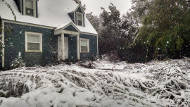
I know I haven't been keeping up with posting about the progress of my home native ecology restoration project, and as time goes on, it gets harder and harder to figure out where to pick it back up. I scanned through the pictures I took in 2017 and 2018 to see what stands out. I've got a lot of great flower pictures and interesting progression series, but to do something quickly, I think I'll share some surprises instead.
2017 February 8 (Wed)
Unsolicited landscape help
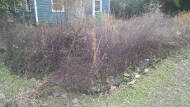
As I was about to sit down to begin writing this, there was a knock on the front door. I had just come inside from taking pictures of the front yard for this post. We don't get very many knocks. Usually just a delivery of our weekly CSA or a brown cardboard box of cat food, books, or shoes, and I was expecting neither today.
2016 September 6 (Tue)
Insects are friends
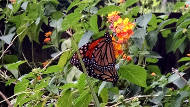
It's taken a while, but the insects have arrived. I don't have a big variety of nectar and host plants yet, but I guess it's enough for now. Besides, it's a whole lot more than most of the other yards I've seen around Baton Rouge. I don't know how these insects survived the journey into the middle of Lawn Town, but they did it. It's now time to chase them around with a camera.
2016 June 19 (Sun)
Describing conditions with graphs
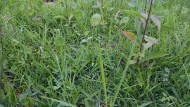
The new front bed that I created in March is an area of stress. I didn't remove the St. Augustine grass after I hoed it and before I sowed seed. I just tossed all the seed right alongside the existing turf grass that I was trying to replace. I was once told (a rumor?) that natives would eventually outcompete the turf grass, so it's not super important to pull everything first.
2016 May 22 (Sun)
Progress report
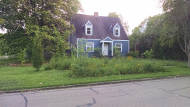
It's been a long time since I've shared pictures of the yard and not just close-ups of plants. For everyone who's questioned how things are actually going these days, today's the day. (Except for the back alley. I didn't actually take a picture of it this time.)
2016 April 10 (Sun)
Spring flowers
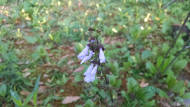
I'm noticing that the exotics flower early in spring, and that's what everyone associates with a Louisiana spring, azalea cultivar mutants being the main ones. There's also the Bradford pear, a cultivar of the invasive Callery pear from China and Vietnam. Well, the real Louisiana plants — at least the ones I have — flower a little later than that. I'm guessing it's because they and the insects that feed on them have evolved together, and insects aren't active until later on in late March and April. I don't know, but I decided to go around this morning and take pictures of all the pretty colors. Mostly, these are isolated plants, so don't think that I have lush gardens of mass plantings yet.
2015 October 23 (Fri)
Fall color
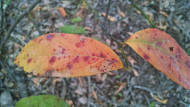
Woot! It's fall, the usual weird mix of warm, humid days and refreshing cool fronts. I decided a while back to make sure I have native plants with strong fall color. It's taking a while for things to mature, of course, but this is the first fall where there's a good hint of what's to come in the future.
2015 September 3 (Thu)
Late summer fruits and flowers
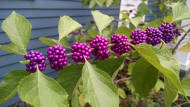
It's looking like the hot summer drought has ended here. As the sun is moving closer to equinox, temperatures are now only going up to about 92°F. Many plants are doing better after some rain showers last week gave them water to drink. We even had a pretty good cold front come through. Fall is coming, so I figured it's a good time to focus on all the fruit and flowers around the yard to make me feel like my efforts didn't all end in failure this summer.
2015 August 2 (Sun)
A hot, dry summer
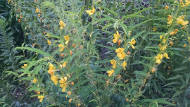
A lot of plants found themselves put on my "At Risk" list this weekend. With temperatures rising to 95-100°F every day for the past 3 weeks and little rain for most of that time, I've decided to adjust my preference for what I plant and where. I know it takes a couple years for many plants to establish, so I'm not giving up on the newly planted stuff. Those guys generally need regular watering under dry conditions, even if they're native. And pretty much everything in a pot needs regular watering because their roots have limited reach. Also, established plants can go somewhat dormant in the heat of the summer and then come back to life when the temperatures start to lower again in the fall. So taking all of this into account, I've made a list of stand-out individuals and a list of questionable individuals.
2015 June 29 (Mon)
Overgrown but not forgotten
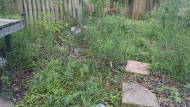
It has rained pretty consistently for the past month and a half. Not non-stop. Just frequently enough that the ground hasn't dried out. So the weeds are taking over. The St. Augustine grass is growing fast and tall and sending out stolons everywhere. Camphor, Chinese tallow, chamberbitter, low hop clover, and some crap exotic grasses are sprouting faster than I can remove them. There are a lot more dormant seeds in the yard than I expected. I can't imagine ever getting the yard to a state of natives consistently crowding out exotics.


